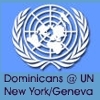

| BRIEFING - February 13, 2013 | To learn more about the Millenium Development Goals, click on the graphic Past Briefings: January 30, 2013 December 19, 2012 December 5, 2012 November 16, 2012 October 17, 2012 September 26, 2012 September 12, 2012 August 29, 2012 July 11, 2012 May 30, 2012 May 16, 2012 April 18, 2012 April 4, 2012 March 7, 2012 |
|
We are all responsible for the common good It has been said that “Generations live and die in poverty, in a vicious, never-ending cycle. Their voices are not stifled, they are not silent; they are just unheard. For the impoverished, the most important need is an opportunity” (Human Development Foundation). Simply put, persons living in poverty want no more than any one of us. We have been presented with an array of opportunities that have made it possible for us to tap into otherwise latent power and capabilities, making it possible for us to experience a sense of accomplishment in our lives. But what about those who have not had the opportunity to experience this? What makes the playing field so unequal? Commission for Social Development For the past week, the United Nations Commission for Social Development has been addressing the priority theme of promoting the empowerment of people in eradicating poverty, social integration and full and decent employment for all. While the formal sessions are for discussion and debate among government representatives, civil society does whatever it can to make sure its voice is heard as well. One of the ways this is done is through the Civil Society Declaration, which is an opportunity for NGOs to share with governments what we believe to be non-negotiable elements in the ongoing discussions on the priority theme. As representatives of direct service providers, development, advocacy and grass-roots non-governmental organizations, our colleagues live and work with people living in poverty; those who are most vulnerable to natural disaster, economic and financial shock. It is our goal to in some way partner with them in overcoming the scourge of inequality that quite literally consigns them to a lifetime of endless suffering. Empowerment and Participation In a globalized world, too often driven by economic and financial engines, it is easy to lose sight of People and of the Planet which serves as our common home. When wealth and power are sought as ends in themselves, the gap between the haves and the have-nots widens, destabilizing society in the process. Empowerment has increasingly emerged as a key tool in countering the pernicious effects of social and economic inequalities; and, participation is the practical way by which empowerment is measured. However, neither empowerment, nor participation are givens. Participation is power; and distribution of power is often associated with inequality—especially with respect to gender bias and economic resources. However, a “shared society” (World Summit for Social Development, Copenhagen, 1995) is based on mutual respect that flows from human rights and equality, where each member is responsible, and has a contribution to make for the good of the whole—the common good. The Office of the United Nations High Commissioner for Human Rights reminds us that persons living in poverty are caught in a vicious cycle of powerlessness, stigmatization, discrimination, exclusion and material deprivation; and that the lack of participation in decision-making is a defining feature and cause of poverty. Furthermore, despite the fact that participation is a crucial element in a human rights-based approach to development and poverty reduction, there is little consideration given to what is needed to create the environment in which persons living in poverty are able to be participatory members of their respective societies. Civil Society Recommendations Civil society believes that these are among the most significant ways in which to create the enabling environment which is so necessary in order for people to become agents of their own, and society’s transformation:
What is needed above all to make the empowerment of people a reality is a renewed commitment to the common good, as opposed to narrow national self-interest. The late Pope John Paul II, speaking on the notion of “solidarity,” had this to say:
A good reminder not only to governments, but to ourselves as well.
|
Dominican Leadership Conference
Building relationships and collaborating in the mission of preaching the Gospel
29000 West Eleven Mile Road
Farmington Hills MI 48336
248-536-3234 Contact: Executive Director
